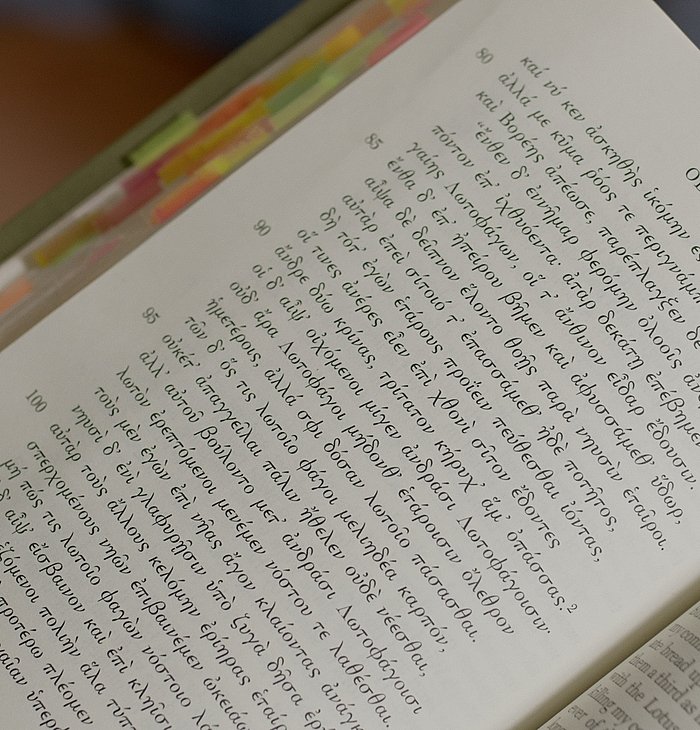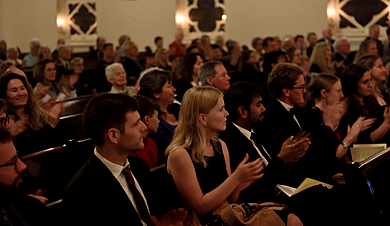

A return to reason: How Classical languages can restore modern universities
News 3rd May 2025
Revival of a long-simmering debate in academia about the value of studying the humanities, and the ancient languages which for so long gave them voice, is a welcome–if unexpected–outcome of the scrutiny that legacy universities in the United States are facing in 2025
Classicists have warned for decades that stripping the intellectual tradition of a common language, freedom of inquiry and debate would undermine the very society that graduates aspire to lead. This claim, so long met with ambivalence, or even disdain, is now manifested in the apocalyptic mood pervading all sectors of the university, administrators included.
Yet, in the rapidly evolving political climate, an obvious and economically sound solution has emerged: to return the university to its original mission of preserving and advancing knowledge. In the country-wide debate about what purpose modern colleges should serve three core benefits are finding support.
Access to “creative insight and practical wisdom”
In a single year of study in Ralston College’s Master of Arts in the Humanities program, students learn to read and write Ancient Greek, immersing themselves in Homer, Plato, the Gospel of John and other Classical authors, providing them direct access to what scholar Alex Petkas recently described as the “well-spring of creative insight and practical wisdom”.
While many of the challenges of the modern moment may be novel, the works of ancient thinkers so often foreshadow them, while highlighting universal truths which can shepherd us through them. Graduates of Ralston’s first three cohorts widely attest to having been enriched by the ideas of ancient philosophers and authors; almost invariably, though separated by millennia, they came to regard them as friends.
In his April 2025 article for The American Mind, Petkas describes several striking experiences among Ralston’s second cohort of MA students. He sat among them as they were “discussing Plato’s Republic in Attic Greek”. These students, he writes, “were already beyond the skills of many PhD students… and they had only begun studying the language four months earlier.”
As an indication of how closely the cohort attended to the texts studied, Petkas recalls how he “was regaled at dinner by a student reciting from memory the entire first chapter of the Gospel of John in Greek”.
Befriending the Ancients is a welcome and rewarding counterpoint to the antagonism and unrest plaguing many legacy institutions. For his part, Petkas describes modern campuses as not “an open-minded utopia, but instead the totalitarian rule of experts attempting weakly to manage and manipulate a populace linked only by the weakest of ties, robbed of a common culture, and deeply suspicious, because largely ignorant, of any historically rooted principle that predates World War II.”
This outcome has attracted global attention, provoked the ire of America’s 47th President, and yet received paradoxically little consideration from students.
Inspiration
Whether Ralston College graduates draw on the education they gain through four terms of study under world-class professors to help interpret other works of philosophy, literature and art, to root themselves more securely in the western tradition, or to bring moral guidance for their own life choices, they each leave Ralston inspired and endowed with the unshakeable confidence that knowledge brings.
The fact that the ideas they have examined helped shape modern democracy and–to some extent–the very Constitution governing the United States is secondary to the self assurance they enjoy from having learned in an environment that prioritizes freedom of thought, inquiry, and civilized debate.
Absent the time-consuming turmoil upsetting universities elsewhere, Ralston College students develop a collective enthusiasm for studying the humanities and the ancient languages that transmitted them.
As the scholar Jaspreet Singh Boparai says in his recent article for First Things, Ralston “students and staff alike possess an authentic missionary zeal that can only come from love of the subject”. The striking effects of this shared passion for learning were apparent on his own visit to the College. “The results are little short of miraculous,” he writes. “Students who had never previously studied Latin had a superior grasp of the language compared to undergraduates I taught at Cambridge who had been learning Latin since the age of eight."
Shared language begets Truth
Hardened by decades of skepticism about the merits of studying the humanities, even some professional Classicists have come to dismiss the imperative importance of learning Ancient Greek and Latin.
More than a mere rite of passage among the intellectual class, learning these languages is an exercise that cultivates in students discipline and the confidence that follows from fluency. Studying Greek and Latin–the shared languages of the Western intellectual tradition–also initiates them into a community of scholars. Crucially, through the labor of learning a foreign language, they can metabolize the ideas of ancient thinkers in the form they were first presented. Only with this fundamental understanding can students go on to explore them freely.
For all the value that learning Greek and Latin affords young scholars, it is a realm of study also under pressure to conform to the modern fervor for equity. In his recent piece for the New Criterion, Latinist Joshua T. Katz cites, with some incredulity, a colleague who sympathizes with proposed changes to the Latin spoken at the University of Oxford’s conferral of degrees.
The debate, driven by a concern to provide “non-binary inclusive” in a language that is explicit about grammatical gender, culminated in Oxford’s decision on April 29th to adopt the proposed changes.
David Butterfield, Professor of Latin at Ralston College, offers his assessment about the practical effect of Oxford’s decision to change the university’s ceremonial texts in order to disguise words specifically marked as masculine or feminine in gender: “No one seeks to write Latin in this fashion so the result is very odd. It really is Schrodinger's Latin.
“Latin was the language of learning in western Europe for two millennia, and is the quintessential language of the university. It remains the ceremonial language not as a fancy or pretentious gesture but because it has survived as the historical and formal way of conducting important business, however much the wider world has moved on. New Latin terms are often coined for newly-forged subjects and degrees, and Latin can well accommodate that. What it cannot well accommodate is being contorted to hide the fundamental fact that it is a language that operates with grammatical gender baked into it.”
Beyond his common sense and candor, which established Dr Butterfield as a much-loved professor among students in Ralston College’s inaugural Latin Summer Program, his critique lays bare how easily modern problems can complicate what universities once held sacrosanct: Truth.
Butterfield explored the debate around these socially-motivated changes to 800 years of tradition that have guided Oxford’s graduation ceremonies through the ages. Among fellow academics quoted in a recent article for The Telegraph is Professor Douglas Hedley of the University of Cambridge, who has also become an esteemed lecturer at Ralston College: he anticipated Oxford’s decision as “a lamentable index of the decay of our civilisation.”
This episode encapsulates at a small scale the sorts of major choices universities in the United States must soon make if they wish to restore the principles of higher education. Will they double down on their pursuit of a close-minded dogmatism, or revisit some of what helped the greatest universities in the world produce flourishing cultures?
Ralston College: Reason restored
Amid such historic challenges enveloping higher education, Ralston College has been quietly reviving the tenets that established the best schools in the world over so many centuries. In a recent article for Minding the Campus, Mark Bauerlein recalled some of the heartening conversations he had with Ralston students in Savannah: "A Princeton graduate in classics and psychology said he was “sick of the destructive” ways the humanities often approach the classics; Ralston, he believed, was the antidote... A student from Utah Valley University said that the “hoop-jumping” of college had nearly extinguished his “love of learning”—Ralston rekindled it."
The finest testament of Ralston's success since launching in 2022 comes in the form of its graduates, whose accomplishment of completing a Master of Arts in the Humanities is already being dwarfed by their work in the realms of teaching, medicine, law, architecture, publishing, and technology. The College believes that fostering similar success among a greater number of students will rely on the university remaining a space of academic rigor, where all sides of a question can be explored without constraint, where objections can be freely stated, and where civilized debate outweighs appeals to emotion or political dogma.
Its faculty and staff, charged with the urgent work of delivering a program that helps achieve this, are delighted and excited to answer the call.



